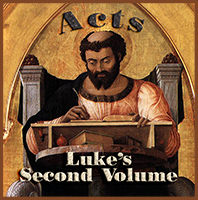
Acts 10:1–23 . . .
“Peter’s Vision of the Clean and the Unclean”

Today's passage deals with prejudice. The story of the gospel spreading beyond Jewish boundaries toward the non-Jewish Gentiles teaches us from the life of Peter that we all have built-in prejudices that God must break down if we're going to be effective in his service.
[Note: Find and read today’s Scripture near the bottom of this page.]
Peter was staying at Joppa on the Mediterranean Coast. It was the city where the prophet Jonah had fled to board a ship to Tarshish. He was trying to run from the Lord’s command to go and preach at Nineveh, the capital city of Israel’s arch-enemy, Assyria. About 30 miles north of Joppa, and some 65 miles northwest of Jerusalem, was the Roman provincial capital, Caesarea, where the governor lived. Under his authority were some 3,000 troops, including an Italian cohort. Serving with this unit was Cornelius, a centurion who commanded 100 soldiers. The Jews despised the Roman occupation of Palestine; they hoped that Messiah would come and deliver them from Roman oppression.
The stage is set: On stage we see a non-Jewish Roman soldier, representing the despised occupation of Israel, residing in the main city of Roman occupation. Thirty miles south you have a Jewish apostle, temporarily residing at Joppa. Behind the curtain, God is orchestrating the events that bring these two men together in a way that shocked both of them by breaking down the wall of prejudice between them. The result of the story is that today, everyone of us Gentiles are fellow heirs and church members with the Jews, and fellow partakers of the promise in Christ Jesus through the gospel. Luke regarded this as an extremely important story because he includes it three times in this book: chapters 10, 11, and 15.
Acts 8–12 shows us how the early Jesus community becomes an international movement.
Philip in Samaria | Sorcerer Simon | Philip and the Ethiopian (ch. 8)
Saul’s Conversion | Saul in Damascus and Jerusalem (ch. 9)
Cornelius Calls for Peter | Peter’s Vision | In Cornelius’ House (ch. 10)
Peter Explains His Actions | The Church in Antioch (ch. 11)
Peter’s Miraculous Escape From Prison | Herod’s Death (ch. 12)
› Watch BibleProject’s superb animated video (2 min.) that highlights Luke’s account of the growing multi-ethnic Church.
Cornelius Calls for Peter (10:1–8)
In Matthew 16:19, Jesus said to Peter, “And I will give you the keys of the kingdom of heaven.” Do you wonder what Peter did with those kingdom keys and how effective he might have been?
He opened the door for the Jews (Acts 2) and Samaritans (Acts 8). Peter uses the "keys of the kingdom" in these eight verses by receiving and acting on divine visions that shatter Jewish ceremonial barriers, preparing him to enter a Gentile's home and proclaim salvation to Cornelius' household, thus opening the door to Gentiles; this morning we'll see how he opened that door to the Gentiles.
Thirty miles north of Joppa was another coastal city, Caesarea, which had been built as a showcase of luxury and was furnished with a splendid harbor developed by Herod the Great. In the days of the early church, it served as the Roman capital of Judea. There lived Cornelius, a centurion in the Roman army. A centurion was so named because he was the officer in charge of a fighting unit called a "century" (from Latin centum, which means "hundred"), which contained about a hundred soldiers.
Cornelius was a member of the Italian "band," a.k.a. "cohort." It was a unit of 600 warriors who made up one tenth of a Roman legion which, when fully manned, numbered about 6,000 warriors.
The centurion was the backbone of the Roman army. Exercising personal supervision of all men under his command, he was chiefly responsible for good morale in the ranks. On the battlefield, he made many decisions designed to turn outcomes to victory. Centurions had a reputation for being unusually capable and dependable. All the centurions mentioned in the New Testament appear in a good light.
It's interesting to wonder why the New Testament is so kind to officers of an army that held the Jewish nation in servitude. Perhaps they represent the kind of convert that Jesus was seeking in the Gentile world; he was looking for all those in every nation who'd be willing to serve as faithful and conscientious soldiers of the Lord.
Cornelius was a Gentile, not a Jew. Yet Scripture describes him as a devout man, faithful in good works and a life of prayer. He was a God-fearer so outstanding in his piety that God chose him to be the first non-Jew convert to Christianity.
An angelic messenger from God appeared to him one day (v. 3) while he was praying. His natural reaction was to be afraid, but the angel calmed his fears by assuring him that God was pleased with his prayers and good deeds. The angel implied that God was now ready to bless him; however, to obtain the blessing, he had to follow instructions. First, he had to send men to Joppa for the purpose of fetching Simon Peter, who was staying with Simon the tanner. Then when Peter came, Cornelius had to follow whatever directions Peter would give him.
As a good soldier, Cornelius hastened to carry out his orders to the letter. Immediately (v. 7), he called three trusted servants; two from his household and one from the army. The soldier, doubtless the appointed leader of the group, was a devout Gentile, and perhaps the others were as well. After they all reported to their master, he sent them off to find Peter.
Peter’s Vision (vv. 9–16)
God gives a vision to Peter in the next eight verses. While Cornelius's men were walking to Joppa, Peter was having a quiet day at Simon's house. We might think it strange that someone would go up on the housetop to pray, but that was a common custom in that day because roofs were flat. It would give someone a good place to go and be alone with God. It’s interesting that God gives Peter a vision concerning things to eat when he's so hungry. Why? That’s where Peter’s mind is, so that’s how God will speak to him!
God was sending his message to Peter in the form of a vision. He didn’t get it initially, but it finally registered by v. 28, a few days later, as we'll cover in next week's discussion. The primary message wasn't that Jewish dietary laws had changed; the message was about people, not animals. God accepts into fellowship all people who believe in Christ, including non-Jewish Gentiles.
Simon the tanner was a leather-worker. The Jewish people regarded his trade as disreputable and disgusting because a tanner’s work required that he surround himself with the bodies and skins of dead animals. To touch a clean animal that had been slaughtered or hunted down by man didn't make a person unclean (Leviticus 11:10–16); but it was defiling to touch the carcass of a clean animal that died of itself (Lev. 11:39; 17:15–16).
Simon the tanner’s house was outside Joppa, along the coast of the Mediterranean. Toward noon (the sixth hour by Jewish accounting), Peter walked up to Simon's housetop to pray. After spending time with the Lord, Peter became hungry and called for food. While he sat waiting for the servants to prepare it, he fell into a "trance" in which God took control of his mind while he was awake.
In his trance Peter saw a strange vision: A large sheet appeared in the sky and descended before his eyes; it looked as though the sheet was suspended from cords tied to its four corners; riding on the sheet was a zoo of animals, among them were birds, mammals, and reptiles and insects; when this collection stopped in Peter's sight, he heard a voice saying, "Get up, Peter. Kill and eat" (v. 13).
Peter had no doubt that the animals were real. Such a command to a man waiting for his dinner was entirely reasonable. But he saw that all the animals were "unclean." The law of Moses allowed the nation of Israel to eat meat, but only from "clean" animals. Many animals were labeled "unclean," unfit for consumption.
As a good Jew who'd always kept the law, Peter refused to obey, even though he recognized the voice as the Lord's. Perhaps it was Jesus speaking in a voice similar to his earthly voice, very familiar to Peter. He protested, "Surely not, Lord!. . . I have never eaten anything impure or unclean." The Lord rebuked him, saying, "Do not call anything impure that God has made clean." Again the voice commanded him to eat; again he refused; again the voice rebuked him. The same dialog occurred yet a third time before the sheet rose up and disappeared into heaven.
The Meaning of His Vision Afterward, Peter considered the vision but failed to understand it right away. Its meaning became clear only after he received Cornelius's request. The vision expressed God’s desire to break down that barrier that hindered Jewish Christians from reaching the Gentile world.
This barrier was the Jewish attitude toward Gentiles. A good Jew thought that non-Jews were disgusting; he'd go out of his way to avoid them; he'd never enter one of their houses; he viewed as unclean even the ground and air connected with their land. A Gentile's body was, from the standpoint of ritual purity, also unclean.
With such an attitude, Jewish Christians found it extremely difficult to fulfill the Great Commission, commanding them to "share the gospel with the entire world." Many couldn't imagine God really wanting them to bring non-Jews into the church. To overcome Jewish prejudice against other races, God gave Peter a vision, showing that the time had come to stop treating Gentiles as if they were "unclean animals."
Visitors Arrive (vv. 17–20)
As Peter pondered his vision, Cornelius's messengers reached Simon’s gate, announcing their presence by calling out a greeting. When someone responded, they asked whether a man named Simon Peter was lodging within. Peter himself didn't hear the voices outside, but the Spirit alerted him to the visitors' arrival, telling him to go down and meet them. They'd summon him to another place to which he should go, confident that God had sent them and was sending him.
At this point, God hasn't told Peter that his visitors are Gentiles. Normally, a godly Jew such as Peter wouldn't associate with non-Jews. Knowing this, and knowing Peter's previous resistance ("Surely not, Lord!"), God simply "surprised" Peter with the knowledge that these men were Gentiles. All Peter needs to know is that it was the Spirit who said, I have sent them.
Back to Caesarea (vv. 21–23)
Peter went with the messengers back to Caesarea to see Cornelius, a non-Jew who was an officer in the Roman army, wanting to hear the gospel from Peter, who'd never done anything like this before! How will Peter respond? By entertaining these Gentile guests, he went against the customs and traditions of Israel, but not against God's Word.
"The next day, Peter started out with them, and some of the believers from Joppa went along" (v. 23). Peter reached out in love to his Gentile neighbors, in obedience to what God had told him to do.
† Summary of Acts 10:1–23
In Acts 10:1–23, a devout Roman centurion named Cornelius in Caesarea — known for his prayers, alms, and God-fearing household — receives an angelic vision directing him to send men to Joppa for Simon Peter, staying with a tanner by the sea. Concurrently, Peter, praying on a housetop and falling into a trance, sees a sheet descend from heaven filled with unclean animals, hears a voice commanding him to eat, and — after protesting three times — learns, “Do not call anything impure that God has made clean,” preparing him for Gentile inclusion. Puzzled yet prompted by the Spirit, Peter welcomes Cornelius’ envoys, agrees to accompany them, and sets out with Joppa believers.
Key points with verse references:
• Cornelius’ piety rewarded: His faithful prayers and generosity prompt an angel to orchestrate gospel access through Peter (10:1–8).
• Vision breaks barriers: The sheet of “unclean” creatures thrice teaches Peter God’s cleansing overrides Jewish food laws and ethnic prejudices (vv. 9–16).
• Spirit confirms welcome: Peter obeys the divine nudge to go freely with Gentiles, bridging Jew and outsider (vv. 17–23).
- Q. 1 In what three ways is Cornelius's devotion to God portrayed?
- Q. 2 Should every Christian try to reach those who are culturally different? Or should that ministry be for only those having such a gift?
Acts 10:1–23
New International Version (NIV)
[View it in a different version by clicking here; also listen to chapter 10.]
† Watch this video clip of Acts 9:32–11:10, starring Bruce Marchiano as Jesus, James Brolin as Simon Peter, Harry O. Arnold as Saul/Paul, and Dean Jones as Luke.
Cornelius Calls for Peter
10 At Caesarea there was a man named Cornelius, a centurion in what was known as the Italian Regiment. 2He and all his family were devout and God-fearing; he gave generously to those in need and prayed to God regularly. 3 One day at about three in the afternoon he had a vision. He distinctly saw an angel of God, who came to him and said, “Cornelius!”
4Cornelius stared at him in fear. “What is it, Lord?” he asked.
The angel answered, “Your prayers and gifts to the poor have come up as a memorial offering before God. 5Now send men to Joppa to bring back a man named Simon who is called Peter. 6He is staying with Simon the tanner, whose house is by the sea.”
7When the angel who spoke to him had gone, Cornelius called two of his servants and a devout soldier who was one of his attendants. 8He told them everything that had happened and sent them to Joppa.
Peter’s Vision
9About noon the following day as they were on their journey and approaching the city, Peter went up on the roof to pray. 10He became hungry and wanted something to eat, and while the meal was being prepared, he fell into a trance. 11He saw heaven opened and something like a large sheet being let down to earth by its four corners. 12It contained all kinds of four-footed animals, as well as reptiles and birds. 13Then a voice told him, “Get up, Peter. Kill and eat.”
14“Surely not, Lord!” Peter replied. “I have never eaten anything impure or unclean.”
15The voice spoke to him a second time, “Do not call anything impure that God has made clean.”
16This happened three times, and immediately the sheet was taken back to heaven.
17While Peter was wondering about the meaning of the vision, the men sent by Cornelius found out where Simon’s house was and stopped at the gate. 18They called out, asking if Simon who was known as Peter was staying there.
19While Peter was still thinking about the vision, the Spirit said to him, “Simon, three men are looking for you. 20So get up and go downstairs. Do not hesitate to go with them, for I have sent them.”
21Peter went down and said to the men, “I’m the one you’re looking for. Why have you come?”
22The men replied, “We have come from Cornelius the centurion. He is a righteous and God-fearing man, who is respected by all the Jewish people. A holy angel told him to ask you to come to his house so that he could hear what you have to say.” 23Then Peter invited the men into the house to be his guests.
Peter at Cornelius’s House
The next day Peter started out with them, and some of the believers from Joppa went along.




